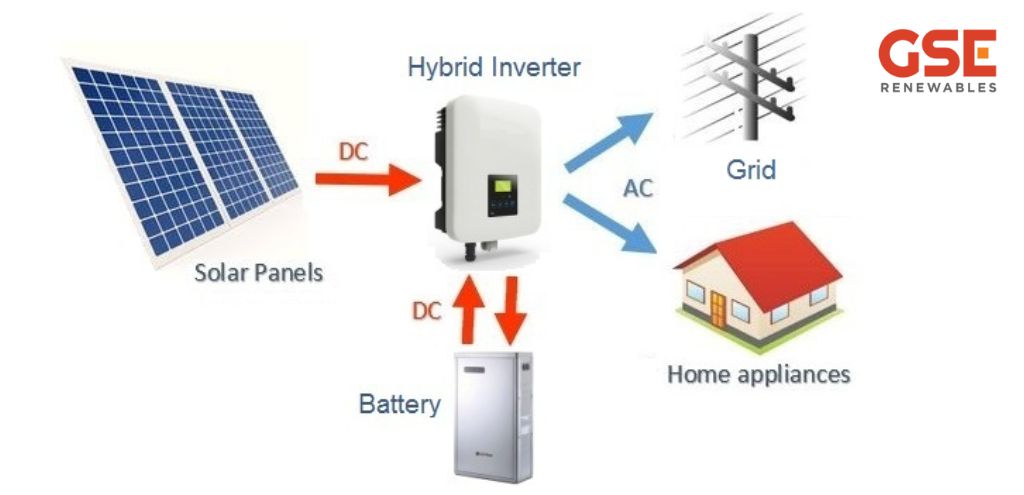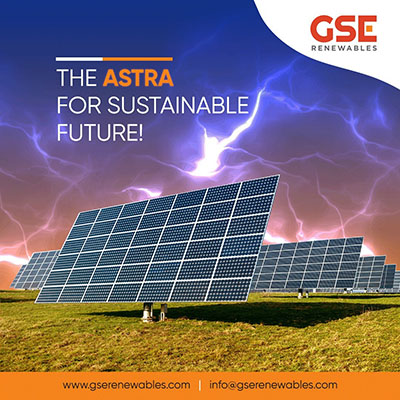500 kW Solar Power Plant Cost in Gujarat: Complete Price & Savings Guide
Nov 26

Hybrid solar systems harness usable electricity with the aid of hybrid solar inverters and batteries, allowing for energy storage for later use. These systems operate similarly to traditional grid-tied solar setups but offer the added benefit of energy storage, doubling as a backup power source during outages.
The attraction of hybrid solar systems is their ability to deliver uninterrupted electricity even when the grid goes down. Dive deeper to learn about the components, cost, and different types of hybrid solar systems.
Solar power systems are classified into three types: on-grid, off-grid, and hybrid inverters. A hybrid solar system combines the benefits of both on-grid and off-grid systems while reducing the disadvantages of each. It connects to the grid through net metering while featuring a battery backup to store solar-generated power. The energy collected by hybrid solar panel passes through a best hybrid solar inverter to produce electricity.
The most major benefit of a hybrid solar power system is its backup power capabilities, which ensures continuous electricity delivery even during power outages. The battery backup stores excess energy generated during peak hours.
It’s important to note that:
A hybrid solar system comprises four essential elements:
Solar Panel: These panels convert solar energy into DC electricity and are a cornerstone of the solar system.
Hybrid Inverter: This critical component regulates voltage and converts DC to AC, which powers household appliances.
DCDB (Direct Current Delivery Box): The DCDB contains a fuse, SPD, and MCB for safety and connects multiple solar panel wires into a string with positive and negative outputs.
Charging Controller: The charging controller enhances battery life by controlling the amount of power entering the battery.
The most cost-effective hybrid solar systems employ a basic inverter, which includes a hybrid solar inverter and charger. It also incorporates smart controls for efficient electricity utilization.Hybrid solar power inverters are classified into four types:
Basic Hybrid Solar Inverter: This common type allows solar energy storage in a battery but may not reliably supply power during outages as it isn’t connected to the grid.
Multimode Hybrid Solar Inverter: An advanced inverter with a built-in backup or a separate unit, enabling battery charging and usage during power cuts.
All-in-one Battery Energy Storage System (BESS): This new hybrid solar inverter includes both batteries and the inverter, easily adaptable to existing solar systems.
Advanced AC Coupled System: These systems employ deye hybrid inverter for battery charging and are simple to use for powering AC loads, though slightly less efficient than DC-coupled systems. Efficiency can be improved by using multiple hybrid solar inverters.
Hybrid solar power systems with batteries provide uninterrupted power supply during outages.
Maximizing solar power through battery storage reduces electricity bills compared to conventional sources.
Hybrid solar inverters require less maintenance as they don’t rely on gasoline, unlike traditional power sources.
A hybrid solar system offers reliability by ensuring constant electricity supply:
While hybrid solar systems are more expensive than typical on-grid and off-grid systems, they save money on electricity bills and provide continuous power. In India, a 1kw hybrid solar system, 5kw hybrid solar system, 10kw hybrid solar system price may cost around ₹1,00,000, while a 20kW system can reach ₹15,00,000. Prices vary based on quality, manufacturers, availability, and other factors, so exact costs differ between sellers, models, and installers.
Solar Diesel Hybrid System: Combining photovoltaics and diesel gensets, this system stores energy for on-demand use, ensuring continuous power supply even during grid failures.
Solar PV Wind Hybrid System: While relying on wind as the primary energy source, this system may require additional energy sources for consistent power generation.
Solar Thermal Hybrid Systems: These systems generate power and provide heating, boasting a lifespan of around 20 to 25 years and high efficiency compared to conventional systems.
Because of its renewable nature, solar energy is expected to expand in popularity over the next decade. Understanding the benefits of various solar systems is critical for making educated judgments. Hybrid systems save money while also providing the crucial feature of battery backup for continuous power delivery.
A hybrid solar power system typically lasts 10-15 years, but proper care can extend its life up to 20 years.
A solar inverter battery can last 4 to 5 years with regular maintenance.
Yes, hybrid solar systems are ideal for reducing electricity bills and ensuring uninterrupted power supply.

Our Blogs With a combined experience of over 250 years and the successful management of 30 MW of solar energy projects, GSER offers the most efficient solutions. 500 kW Solar Power Plant Cost in Gujarat: Complete Price & Savings Guide What is a 500 kW...
Read MoreOur Blogs With a combined experience of over 250 years and the successful management of 30 MW of solar energy projects, GSER offers the most efficient solutions. Why Solar Power Is Booming in Gujarat for Businesses Over the last decade, Gujarat has become one of...
Read MoreOur Blogs With a combined experience of over 250 years and the successful management of 30 MW of solar energy projects, GSER offers the most efficient solutions. Solar Opex Model: For Rooftop Solar with No Upfront Investment What is the OPEX Model in Solar Energy?...
Read More